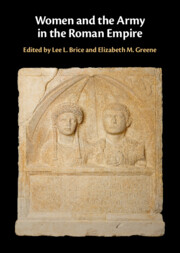Book contents
- Women and the Army in the Roman Empire
- Women and the Army in the Roman Empire
- Copyright page
- Dedication
- Contents
- Figures
- Maps
- Tables
- Contributors
- Acknowledgments
- Abbreviations
- Maps
- 1 Present but not Accounted For
- 2 Approaches to Women and the Roman Army
- 3 Agrippina and Company
- 4 Elite Marriage and Adultery in the Camp
- 5 Mother Courage and Her Children
- 6 Investigating Roles for Women inside Roman Military Bases through Artifact Distribution
- 7 (In)Visible Women and Children
- 8 Soldiers’ Wives en Route in Roman Egypt
- 9 The Role of Women in the Religious Activities of Roman Military Communities
- 10 Mater Castrorum
- 11 Women and the Military in the Age of Justinian
- Index
- References
3 - Agrippina and Company
Elite Women in the Castra
Published online by Cambridge University Press: 24 October 2024
- Women and the Army in the Roman Empire
- Women and the Army in the Roman Empire
- Copyright page
- Dedication
- Contents
- Figures
- Maps
- Tables
- Contributors
- Acknowledgments
- Abbreviations
- Maps
- 1 Present but not Accounted For
- 2 Approaches to Women and the Roman Army
- 3 Agrippina and Company
- 4 Elite Marriage and Adultery in the Camp
- 5 Mother Courage and Her Children
- 6 Investigating Roles for Women inside Roman Military Bases through Artifact Distribution
- 7 (In)Visible Women and Children
- 8 Soldiers’ Wives en Route in Roman Egypt
- 9 The Role of Women in the Religious Activities of Roman Military Communities
- 10 Mater Castrorum
- 11 Women and the Military in the Age of Justinian
- Index
- References
Summary
This chapter examines the presence and role(s) played by elite women in military camps during the early Principate. The chapter starts with a consideration of our sources for elite women and the nature of Roman authors’ treatment of military women. Status consciousness was ever present so the authors define which women could be considered as elite in military settings. After reviewing evidence for elite women in camps the authors examine elite women through the lens of Agrippina the Elder. As a member of the imperial family Agrippina received an unusual level of attention from ancient authors which results in more evidence about her activities in camp. Comparing Agrippina’s behavior with the diverse evidence for other elite women yields a sense of how these women were comporting themselves in military settings. The study reveals that elite women were not disruptive troublemakers. Perhaps not surprisingly, elite women behaved in accordance with Roman culture expectations and elite gender norms, as would have been expected of a Roman matrona.
- Type
- Chapter
- Information
- Women and the Army in the Roman Empire , pp. 54 - 83Publisher: Cambridge University PressPrint publication year: 2024

